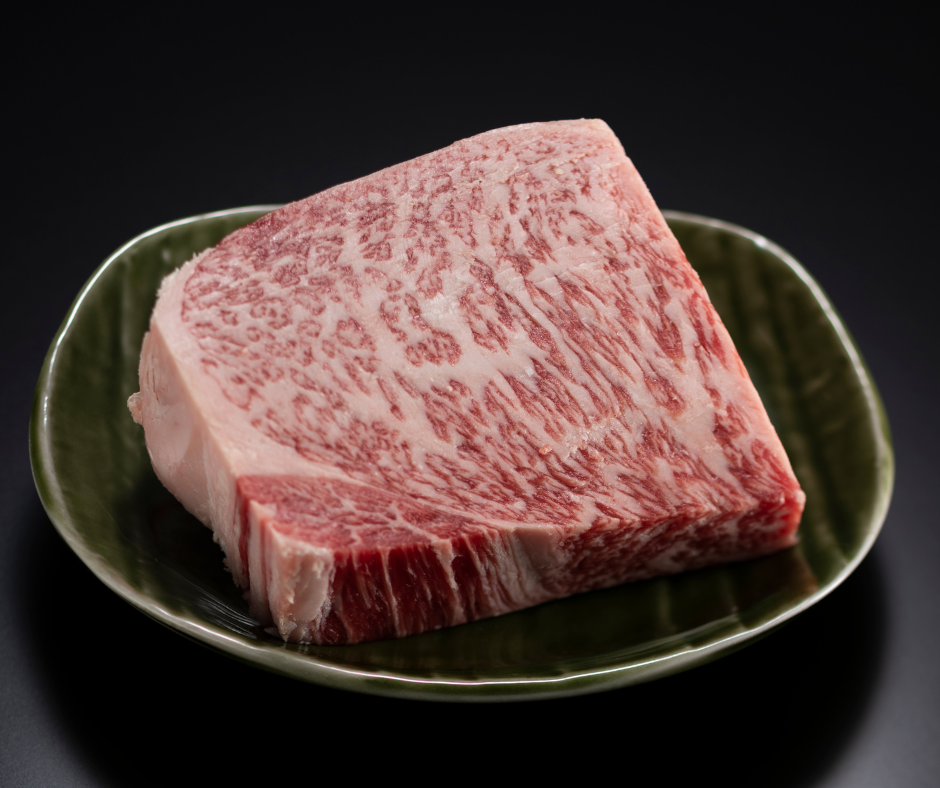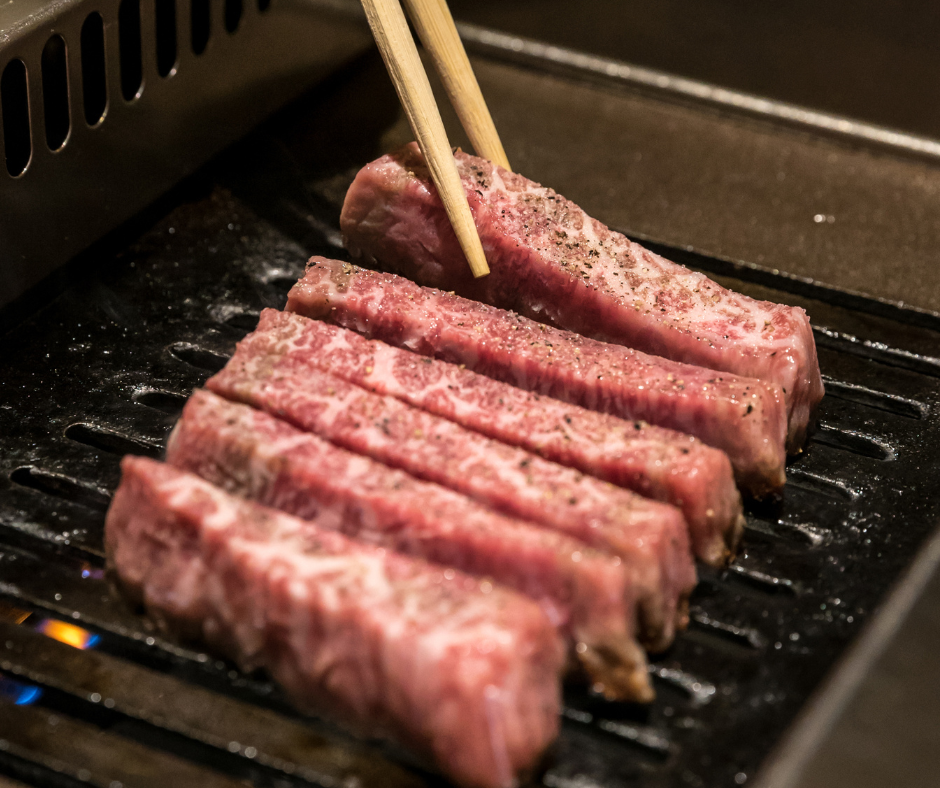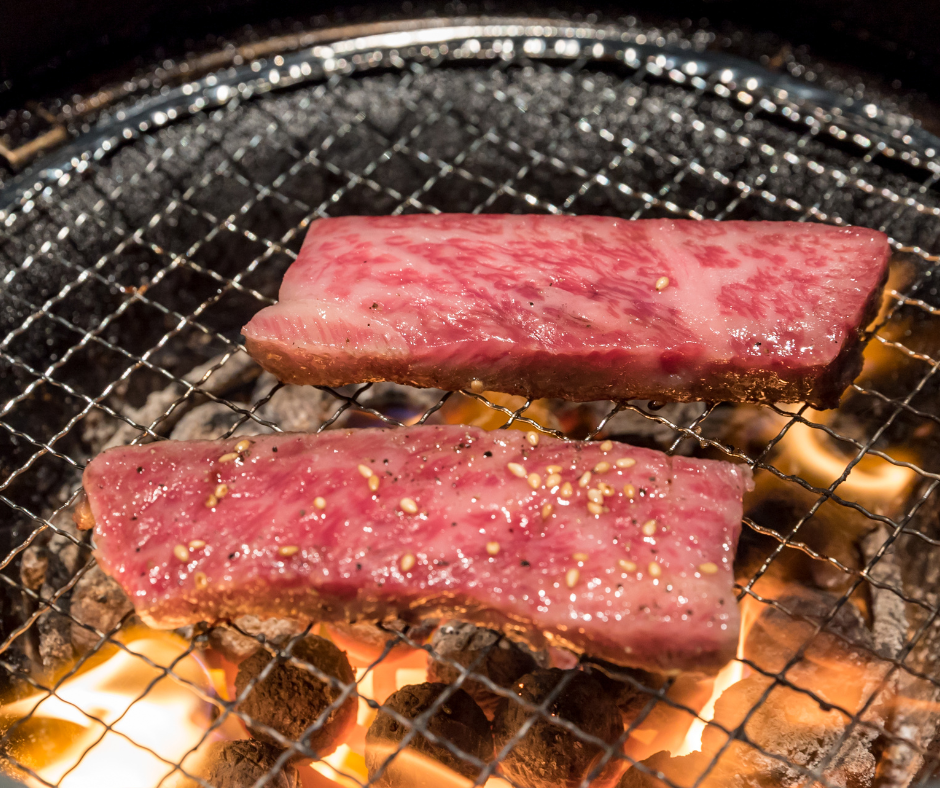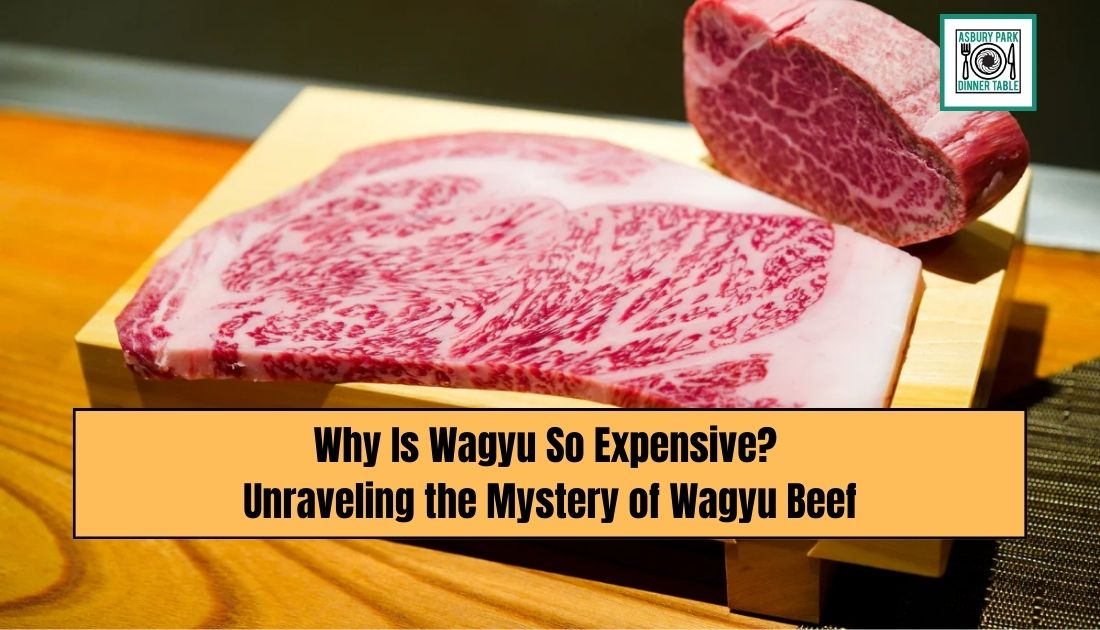Introduction
Wagyu beef has gained a reputation as one of the world’s most exclusive and expensive meats. From its sumptuous marbling to its melt-in-the-mouth texture, Wagyu beef offers an unparalleled luxurious dining experience. But what exactly makes Wagyu beef so special, and Why Is Wagyu So Expensive? In this article, we will explore the allure of Wagyu beef and unravel the mystery behind its sky-high prices.

Understanding The Allure Of Wagyu Beef
Wagyu beef originates from Japan and is known for its exceptional quality and taste. The term “Wagyu” translates to “Japanese cow,” referring to a specific breed of cattle bred and raised in Japan according to strict standards. These cattle are meticulously cared for, with a focus on their diet, environment, and overall well-being.
What sets Wagyu beef apart from other types of beef is its incredible marbling. Marbling refers to the distribution of fat within the meat, and Wagyu beef is famous for its high level of intramuscular fat. This marbling gives the meat a unique flavor and tenderness unmatched by any other beef.
Additionally, the rearing process for Wagyu cattle involves a longer feeding period than other breeds. This extended feeding period allows the fat to distribute evenly throughout the meat, resulting in the distinctive marbling that Wagyu is known for.
Why Is Wagyu So Expensive?
Several factors contribute to the high cost of Wagyu beef. So, Why Is Wagyu So Expensive? Firstly, Japan’s limited land available for cattle farming plays a significant role. Due to its mountainous terrain, Japan has a small amount of suitable land for raising cattle. This scarcity drives up the cost of land and resources needed to rear Wagyu cattle.
Furthermore, the breeding and rearing process for Wagyu cattle is incredibly labor-intensive and time-consuming. Farmers follow strict guidelines to ensure their cattle receive the best care and nutrition possible. From selecting the right genetics to providing a tailored diet and even massaging the cattle to promote muscle development, every step is taken to produce the highest quality beef.
The exclusivity and demand for Wagyu beef also drive up its price. Only a limited number of cattle can be raised yearly, making it a rare and sought-after commodity. Additionally, the unique taste and tenderness of Wagyu beef have gained it a worldwide reputation, further increasing its demand and hence, its price.
In conclusion, Wagyu beef’s allure is its exceptional marbling, flavor, and tenderness. The intricate breeding and rearing process and the limited availability and high demand contribute to its sky-high prices. For those who appreciate the finest dining experiences, Wagyu beef is a truly indulgent choice.
Also Read: Is Chipotle Sofritas Gluten Free: Gluten-Free Considerations for Chipotle’s Sofritas
Wagyu Beef: The Meticulous Breeding Process
The Art Of Raising Wagyu Cattle
Behind the scenes of the Wagyu beef industry lies a world of meticulous breeding and rearing practices. The process begins with carefully selecting genetic lines that will produce the characteristics desired in Wagyu beef. This selective breeding ensures that the cattle inherit exceptional marbling, tenderness, and flavor traits.
The rearing of Wagyu cattle follows a tradition that prioritizes their well-being. These cattle are raised in a stress-free environment with individualized care to ensure their physical and emotional comfort. Specialized farmers dedicate their lives to keeping these expensive cows happy and healthy.
Aside from their longer feeding time, they’re also given health check-ups, provided a stimulating environment, and treated well overall. Happy and healthy cows cost more, but this attention to detail and care contributes to the quality and value of Wagyu beef.
Extended Fattening Periods And Concentrated Feed
One factor contributing to the high price of Wagyu beef is the extended fattening period required. While other beef breeds may require a few months of fattening before slaughter, Wagyu cattle are often fed for up to 30 months or more. This extended fattening period allows the fat to distribute evenly throughout the meat, resulting in the distinctive marbling that Wagyu is known for.
Wagyu cattle are fed a carefully balanced diet that includes high-quality and concentrated feed during this extended period. This feed is specially formulated to enhance the marbling and flavor of the meat. These specialized feeding practices contribute to the unparalleled taste and tenderness of Wagyu beef but also add to its cost.
The cost of concentrated feed significantly drives up the price of Wagyu beef. Each cow consumes an immense amount of feed throughout its extended fattening period. The expense of providing this high-quality feed, combined with the labor-intensive rearing process, contributes to the premium price of Wagyu beef.
In recent years, efforts have been made to produce purebred Wagyu through crossbreeding, potentially introducing more affordable options. However, the demand for authentic Wagyu beef remains high, and its exclusivity continues to drive its price.
In summary, Wagyu beef’s astronomical price tag results from meticulous breeding, extended fattening periods, concentrated feed, and unparalleled marbling. While it’s an indulgence for the few, the allure of Wagyu continues to captivate discerning palates worldwide. So Why Is Wagyu So Expensive?? Happy and healthy cows

The Marvelous Marbling: The Secret To Wagyu’s Flavor And Texture
Exploring The Unmatched Marbling In Wagyu Beef
The exceptional marbling found in Wagyu beef results from the meticulous breeding and rearing practices implemented in the industry. Every step is taken to ensure that the cattle inherit traits such as marbling, tenderness, and flavor, resulting in a final product that is unlike any other.
The art of raising Wagyu cattle begins with careful genetic selection. Breeders choose specific genetic lines to produce the desired characteristics in the beef. This attention to detail ensures that the cattle have the potential for exceptional marbling from the beginning.
The rearing of Wagyu cattle is another crucial aspect of achieving the renowned marbling. These cows are raised in a stress-free environment with individualized care, prioritizing their well-being. Specialized farmers dedicate their lives to keeping these expensive cows happy and healthy. They provide them with longer feeding times, regular health check-ups, and a stimulating environment.
How Marbling Enhances The Eating Experience
The extended fattening period and concentrated feed given to Wagyu cattle contribute to the development of marbling and its distribution throughout the meat. While other beef breeds may require a few months of fattening, Wagyu cattle are often fed for up to 30 months or more. This prolonged period allows the fat to evenly distribute within the muscle fibers evenly, resulting in the characteristic marbling pattern.
The marbling in Wagyu beef enhances the eating experience in several ways. First and foremost, it adds an unparalleled level of tenderness. The intramuscular fat melts during cooking, creating a buttery texture that practically dissolves in your mouth. This tenderness takes the eating experience to another level, elevating it to a luxurious indulgence.
In addition to tenderness, marbling also enhances the flavor of Wagyu beef. The fine fat marbling imparts the meat a rich buttery taste, adding depth and complexity. Each bite is a symphony of flavors, combining to create an unforgettable dining experience.
It’s important to note that the quality and quantity of marbling directly affect the price of Wagyu beef. The meticulous breeding process extended fattening periods, and specialized feeding practices all contribute to the cost of producing this delicacy. However, Wagyu beef remains highly sought after due to its superb marbling, making it a luxurious and unforgettable treat for discerning palates worldwide.
In conclusion, the marvelous marbling found in Wagyu beef results from careful genetic selection, extended fattening periods, and concentrated feed. This exceptional marbling enhances the meat’s tenderness and flavor, creating a unique eating experience. While the price of Wagyu beef reflects the meticulous processes involved in its production, its unmatched quality continues to captivate the hearts and taste buds of food enthusiasts around the globe.
The Cost Of Perfection: Pricing And Rarity Of Wagyu Beef
The Price Range Of Top-tier Wagyu Beef
Wagyu beef has gained a reputation for being one of the most expensive meats in the world, and with good reason. Top-tier Wagyu can command prices as high as $200 per pound, making it a luxurious indulgence for those with discerning palates. But why is the price tag so steep?
Many people claim that the taste and texture make the price worthwhile. Wagyu beef results from meticulous breeding and rearing practices, ensuring that every aspect of the beef meets the highest standards. The cows are raised in a stress-free environment, given individualized care, and provided longer feeding times. This attention to detail results in incredibly tender meat, with a rich, buttery flavor that melts in your mouth.
But not just the taste and texture contribute to the high cost. The rarity of Wagyu beef also plays a significant role. Wagyu cattle are bred in limited quantities, and only a few farms in Japan have the expertise and knowledge to raise them properly. This exclusivity drives up the demand and, subsequently the price. Additionally, the genetic lineage of each cow is carefully selected to ensure the desired traits, such as marbling and tenderness, which further adds to the rarity and value.
Also Read: How Long to Smoke a Pork Butt at 250? Smoking Pork to Perfection
Individual Cows And Their Staggering Sums
It’s not just the price per pound that makes Wagyu beef expensive, but also the astonishing amounts that individual cows can fetch. Some Wagyu cows have been sold for staggering sums of up to $30,000. These cows are highly prized for their exceptional genetics and potential for producing offspring with superior traits.
The breeding process is a meticulous art form requiring expertise and patience. Breeders carefully select specific genetic lines with the desired qualities, ensuring that the calves have the potential for exceptional marbling right from the start. This level of attention to detail and selective breeding drives up the value of each cow, contributing to the overall high cost of Wagyu beef.
In conclusion, the high price of Wagyu beef can be attributed to several factors. The taste and texture of the meat, resulting from meticulous breeding and rearing practices, make it a luxurious culinary experience. The rarity of Wagyu beef, with limited quantities and specific farms dedicated to raising these prized cattle, adds to the exclusivity and demand. Furthermore, individual cows can fetch staggering sums due to their exceptional genetics and potential for producing superior offspring. While the cost may seem steep, many believe that the unparalleled quality and unforgettable taste make it worth every penny.

Is Wagyu Worth It? Weighing The Indulgence
Regarding indulgent culinary experiences, Wagyu beef stands in a league of its own. Renowned for its unparalleled quality, taste, and texture, Wagyu beef commands a hefty price tag. But is it worth the splurge? Let’s dive deeper into the factors that make Wagyu beef so expensive and unravel the mystery behind its value.
The Subjective Value Of Wagyu Beef
The subjective value of Wagyu beef is often the determining factor in whether it is worth the high price. Those who have enjoyed tasting this delicacy describe it as a culinary revelation. The melt-in-your-mouth texture, the intense marbling that creates a buttery flavor, and the tender juiciness are unlike anything else in the beef world. For true gastronomy connoisseurs, the experience of savoring Wagyu beef is worth every penny.
Factors To Consider When Assessing Its Worth
To truly understand ‘Why Is Wagyu So Expensive?’ and whether it is worth it, we must explore several key factors.
1. Limited Land in Japan: One of the main reasons for the high cost of Wagyu beef is the limited land available for cattle in Japan. This scarcity drives up the demand and, subsequently the price.
2. Unique Breeding Practices: Wagyu cattle are meticulously bred and reared to ensure exceptional quality. They are raised in a stress-free environment, given individualized care, and provided with longer feeding times. These practices result in incredibly tender meat, with exceptional marbling and a rich flavor profile.
3. Rarity and Exclusivity: Wagyu beef is produced in limited quantities, and only a select few farms in Japan have the expertise to raise these prized cattle. This exclusivity plays a significant role in driving the demand and price of Wagyu beef.
4. Shipping and Import Costs: Another factor contributing to the high price of Wagyu beef is the cost of transporting it from Japan to other countries. The shipping and import costs add to the overall price, making it even more expensive than solely based on production factors.
Considering these factors, it becomes clear that the meticulous breeding practices, limited supply, and exceptional taste justify the high price of Wagyu beef. While it may not be an everyday indulgence for most, the experience of savoring Wagyu beef is considered a luxurious treat that is well worth it for those seeking an unforgettable culinary adventure.
In conclusion, Wagyu beef’s high cost can be attributed to several factors, including limited land in Japan, unique breeding practices, rarity and exclusivity, and shipping/import costs. The subjective value of Wagyu beef, with its unmatched taste and texture, further contributes to its worth. Whether for a special occasion or a once-in-a-lifetime experience, indulging in Wagyu beef is a culinary journey that promises to be truly exceptional. So, if you’re looking to elevate your dining experience and are willing to indulge in the finest beef money can buy, Wagyu beef is worth the splurge.
Conclusion
Now you should know the answer to ‘Why Is Wagyu So Expensive?’. The enduring appeal of Wagyu beef lies in its exceptional quality, taste, and texture. Renowned for its unparalleled marbling and melt-in-your-mouth tenderness, Wagyu beef stands in a league of its own. While the hefty price tag may raise eyebrows, understanding the factors behind its high cost unravels the mystery and justifies its value.
Appreciating The Enduring Appeal Of Wagyu Beef
Wagyu beef has captured the hearts and palates of gastronomy connoisseurs worldwide. The subjective value of this delicacy cannot be underestimated. Those who have experienced the culinary revelation describe it as a luxurious treat that creates an unforgettable dining experience. The intense marbling that creates a buttery flavor, the tender juiciness, and the exceptional taste makes Wagyu beef a delicacy like no other.
Satisfying The Curiosity Behind Its Exorbitant Prices
To understand why Wagyu beef comes with an exorbitant price tag, we must investigate the key factors contributing to its high cost. Limited land availability in Japan plays a significant role. The scarcity of space for cattle drives up demand and, subsequently prices. Additionally, Wagyu cattle are meticulously bred and reared, resulting in exceptional quality. They are raised in a stress-free environment with individualized care and longer feeding times, contributing to their tender meat and rich flavor profile.
The rarity and exclusivity of Wagyu beef cannot be overlooked. Only a select few farms in Japan have the expertise to raise these prized cattle, making it a highly sought-after delicacy. This exclusivity further drives up demand and adds to the overall price.
Another factor contributing to the high cost is shipping and import costs. Transporting Wagyu beef from Japan to other countries incurs additional expenses, further elevating its price.
In conclusion, the exceptional quality, limited availability, meticulous breeding practices, and shipping and import costs all contribute to the exorbitant prices of Wagyu beef. While it may not be an everyday indulgence for most, those seeking an extraordinary culinary adventure find it well worth the splurge. The enduring appeal and unmatched taste and texture of Wagyu beef make it a luxurious treat that promises to elevate any dining experience.
So, if you are looking for an exceptional and indulgent culinary experience, Wagyu beef is worth the splurge. Its unique marbling and incomparable taste justify its high price tag, providing a gastronomic journey that will leave you wanting more.
FAQ: Why Is Wagyu So Expensive? Unraveling the Mystery of Wagyu Beef
Q: Why Is Wagyu So Expensive?
A: Several factors contribute to the high cost of Wagyu beef. Firstly, raising these cattle is highly specific and carefully managed. The initial cost of obtaining these breeds for breeding is also significant. Lastly, the high demand and limited supply of Wagyu beef also drive up its price.
Q: How is Wagyu beef different from other types of beef?
A: Wagyu beef stands out due to its unique marbling, which refers to the intramuscular fat distribution throughout the meat. This marbling gives Wagyu beef a buttery texture and rich flavor, making it highly sought after by food enthusiasts.
Q: Are the cattle used for Wagyu beef treated differently?
A: Yes, the cattle used for Wagyu beef are raised in a very specific way to ensure the highest quality meat. They are often crossbred with American and European breeds and raised in Japan. The cattle lead a luxurious life and receive special care, leading to the production of the exceptional Wagyu beef.
Q: How expensive is Wagyu beef compared to other types of beef?
A: Wagyu beef is significantly more expensive than other types of beef. A certified Wagyu cow can cost as much as $30,000, which is ten times higher than the typical American Angus. This, combined with the labor-intensive process of raising and caring for the cattle, contributes to the high price of Wagyu beef.
Q: Why is there a high demand and limited supply of Wagyu beef?
A: The exceptional taste and texture of Wagyu beef have garnered it global recognition and immense popularity. However, the production of true Wagyu beef is strictly regulated and limited primarily to Japan. This limited supply, coupled with the growing demand from consumers, drives the price of Wagyu beef.
Q: Can I get the same nutrients from other types of beef?
A: While Wagyu beef is known for its unique quality and taste, other types of beef can also provide essential nutrients. It’s important to have a balanced diet that includes a variety of protein sources. By incorporating other types of beef and protein-rich foods into your diet, you can maintain a healthy lifestyle without relying solely on Wagyu beef.
Q: Are there different types of Wagyu cattle?
A: Yes, there are four primary breeds of Wagyu cattle in Japan: Japanese Black (the most commonly received type in the United States), Japanese Brown (Red Wagyu in America), Japanese Shorthorn, and Japanese Polled. Each breed has its distinct characteristics and qualities.
Q: How is the production of Wagyu beef regulated?
A: Wagyu beef production is heavily regulated in Japan. Progeny testing is mandatory to ensure the breed purity and quality of the cattle. The strict regulations and quality control measures contribute to the exclusivity and premium nature of Wagyu beef.
Please note that the information provided here is based on online data and should be used to understand why Wagyu beef is expensive. For more detailed information and a comprehensive history, it is recommended to visit the website referenced.

